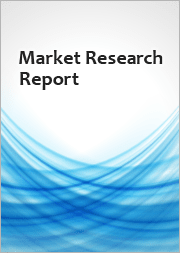
|
시장보고서
상품코드
1898327
커넥티드 헬스케어 시장 규모, 점유율, 성장 분석 : 유형별, 기능별, 용도별, 최종 사용자별, 지역별 - 업계 예측(2026-2033년)Connected Healthcare Market Size, Share, and Growth Analysis, By Type (mHealth Services, mHealth Devices), By Function (Remote Patient Monitoring, Clinical Monitoring), By Application, By End User, By Region - Industry Forecast 2026-2033 |
||||||
세계의 커넥티드 헬스케어 시장 규모는 2024년에 1,019억 6,000만 달러로 평가되었고, 2025년 1,224억 5,000만 달러에서 2033년까지 5,300억 5,000만 달러로 성장할 전망입니다. 예측 기간(2026-2033년) CAGR은 20.1%를 나타낼 것으로 예상됩니다.
시장 분석에 따르면 만성질환을 가진 고령 인구의 급증, 디지털 기술의 진보, 의료 분야에 대한 정부 투자의 확대가 함께 커넥티드 헬스케어 분야를 크게 견인하고 있습니다. 상세한 분석을 통해 경쟁 환경을 형성하는 중요한 시장 부문, 신흥 추세 및 주요 성장 촉진요인이 밝혀졌습니다. 의료 업무에 있어서 인터넷 이용의 보급은 시장 확대를 견인하는 중요한 요소로서 두드러지고 있습니다. 스마트폰, 태블릿, 웨어러블 기기 등의 장치는 임상 데이터의 원활한 전송 및 분석을 가능하게 합니다. 또한 비용 효율적인 인터넷 솔루션에 대한 수요는 진단과 환자 관리를 강화하고 웨어러블 기술의 상승은 생리적 데이터의 정확한 모니터링을 가능하게 합니다. 이를 통해 궁극적으로 건강 상태를 개선하고 보다 연계된 의료 환경을 구축할 수 있습니다.
세계의 커넥티드 헬스케어 시장 성장 촉진요인
만성 질환 증가 추세, 고령화 사회의 진전, 개인화된 예방적 의료 접근법에 대한 수요가 증가함에 따라 커넥티드 헬스케어 솔루션에 대한 큰 요구가 생겨나고 있습니다. 이러한 혁신적인 기술은 원격 환자 모니터링, 텔레메디신, 건강 상태를 추적하고 의료 제공업체가 적시에 개입할 수 있도록 지원합니다. 환자의 건강 상태를 지속적으로 모니터링할 수 있어 연결 서비스는 통원 빈도를 줄이고 건강 상태를 전반적으로 개선할 수 있습니다. 그 결과, 환자와 의료 제공업체 모두의 진화하는 요구에 부응하는 보다 효율적이고 효과적인 의료 제공 시스템의 필요성에 견인되어, 커넥티드 헬스케어 시장은 급속히 확대되고 있습니다.
세계의 커넥티드 헬스케어 시장 성장 억제요인
의료 시스템의 상호 연결성은 기밀성이 높은 환자 정보의 프라이버시와 보안에 중요한 과제를 제기하고 있습니다. 이 환경에서 데이터의 안전한 교환에 대한 우려가 커지고 있습니다. 엄격한 규정 준수를 보장하고 고급 사이버 보안 대책을 구현하는 것은 환자 데이터의 침해로부터 보호하는 데 필수적입니다. 이러한 필요성은 개인의 프라이버시를 보호하는 데 도움이 될 뿐만 아니라 의료 시스템에 대한 환자의 신뢰를 유지하는데 중요한 역할을 합니다. 따라서 이해관계자는 이러한 취약성을 효과적으로 해결하고 연결 건강 관리 서비스의 무결성을 유지하기 위해 환자 정보의 안전한 관리를 우선해야 합니다.
세계의 커넥티드 헬스케어 시장 동향
세계의 커넥티드 헬스케어 시장은 원격 의료 및 원격 환자 모니터링 기술의 보급 확대에 견인되어 변혁적인 변화를 경험하고 있습니다. 이러한 추세는 통신 인프라의 발전, 스마트폰 및 웨어러블 디바이스의 보급과 편리한 의료 솔루션에 대한 수요가 증가함에 따라 크게 추진되고 있습니다. 디지털 건강 솔루션의 통합은 환자의 의료 접근성 향상, 비용 절감 및 전체 의료 편의성 향상을 실현합니다. 의료 제공업체, 혁신자 및 환자가 이러한 솔루션을 점점 더 활용함에 따라, 커넥티드 헬스케어 분야는 현저한 성장이 예상되고, 업계 이해관계자가 환자의 치료 성과와 업무 효율을 향상시키는 새로운 성장 기회를 제공합니다.
자주 묻는 질문
목차
서론
- 조사 목적
- 조사 범위
- 정의
조사 방법
- 정보 조달
- 2차 및 1차 데이터 수집 방법
- 시장 규모 예측
- 시장의 전제조건과 제한
주요 요약
- 세계 시장 전망
- 공급과 수요 동향 분석
- 부문별 기회 분석
시장 역학과 전망
- 시장 규모
- 시장 역학
- 성장 촉진요인과 기회
- 성장 억제요인과 과제
- Porter's Five Forces 분석
주요 시장 인사이트
- 주요 성공 요인
- 경쟁도
- 주요 투자 기회
- 시장 생태계
- 시장의 매력 지수(2025년)
- PESTEL 분석
- 거시경제지표
- 밸류체인 분석
- 가격 분석
- 규제 상황
- 사례 연구
- 기술적 진보
- 무역 분석
- 고객 및 구매 기준 분석
세계의 커넥티드 헬스케어 시장 규모 : 유형별&CAGR(2026-2033년)
- m헬스 서비스
- m헬스 기기
- 전자 처방전
- 기타
세계의 커넥티드 헬스케어 시장 규모 : 기능별&CAGR(2026-2033년)
- 원격 환자 모니터링
- 임상 모니터링
- 원격 의료
- 기타
세계의 커넥티드 헬스케어 시장 규모 : 용도별&CAGR(2026-2033년)
- 진단 및 치료
- 모니터링 애플리케이션
- 웰니스 및 예방
- 교육 및 인식 제고
- 의료 관리
- 기타
세계의 커넥티드 헬스케어 시장 규모 : 최종 사용자별&CAGR(2026-2033년)
- 병원 및 클리닉
- 가정 모니터링
- 기타
세계의 커넥티드 헬스케어 시장 규모&CAGR(2026-2033년)
- 북미
- 미국
- 캐나다
- 유럽
- 독일
- 스페인
- 프랑스
- 영국
- 이탈리아
- 기타 유럽
- 아시아태평양
- 중국
- 인도
- 일본
- 한국
- 기타 아시아태평양
- 라틴아메리카
- 브라질
- 기타 라틴아메리카
- 중동 및 아프리카
- GCC 국가
- 남아프리카
- 기타 중동 및 아프리카
경쟁 정보
- 상위 5개사 비교
- 주요 기업의 시장 포지셔닝(2025년)
- 주요 시장 기업이 채용한 전략
- 최근 시장 동향
- 기업의 시장 점유율 분석(2025년)
- 주요 기업 프로파일
- 기업 상세 정보
- 제품 포트폴리오 분석
- 기업의 부문별 점유율 분석
- 수익의 전년대비 비교(2023-2025년)
주요 기업 프로파일
- Koninklijke Philips NV(Netherlands)
- Sanofi(France)
- Medtronic plc(Ireland)
- Microsoft Corporation(United States)
- Boston Scientific Corporation(United States)
- Qualcomm Incorporated(United States)
- Apple Inc.(United States)
- IBM Corporation(United States)
- Oracle Corporation(United States)
- Honeywell International Inc.(United States)
- Tempus(United States)
- Headway(United States)
- Modivcare(United States)
- Strata Decision Technology(United States)
- Findhelp(United States)
- Canary Medical(Canada)
- Mindset Health(Australia)
- Lyrebird Health(Australia)
결론과 권고
KTH 26.01.15Global Connected Healthcare Market size was valued at USD 101.96 Billion in 2024 and is poised to grow from USD 122.45 Billion in 2025 to USD 530.05 Billion by 2033, growing at a CAGR of 20.1% during the forecast period (2026-2033).
Market insights indicate that the surge in the aging population with chronic illnesses, combined with advancements in digital technologies and heightened government investment in healthcare, is significantly propelling the connected healthcare sector. A thorough analysis reveals critical market segments, emerging trends, and key drivers that shape the competitive landscape. The proliferation of internet usage in healthcare operations stands out as a pivotal factor fueling market expansion. Devices such as smartphones, tablets, and wearables facilitate the seamless transfer and analysis of clinical data. Additionally, the demand for cost-effective internet solutions enhances diagnostics and patient management, while the rise of wearable technology enables accurate monitoring of physiological data, ultimately improving health outcomes and fostering a more connected healthcare environment.
Top-down and bottom-up approaches were used to estimate and validate the size of the Global Connected Healthcare market and to estimate the size of various other dependent submarkets. The research methodology used to estimate the market size includes the following details: The key players in the market were identified through secondary research, and their market shares in the respective regions were determined through primary and secondary research. This entire procedure includes the study of the annual and financial reports of the top market players and extensive interviews for key insights from industry leaders such as CEOs, VPs, directors, and marketing executives. All percentage shares split, and breakdowns were determined using secondary sources and verified through Primary sources. All possible parameters that affect the markets covered in this research study have been accounted for, viewed in extensive detail, verified through primary research, and analyzed to get the final quantitative and qualitative data.
Global Connected Healthcare Market Segments Analysis
Global Connected Healthcare Market is segmented by Type, Function, Application, End User and region. Based on Type, the market is segmented into mHealth Services, mHealth Devices, e-Prescription and Others. Based on Function, the market is segmented into Remote Patient Monitoring, Clinical Monitoring, Telemedicine and Others. Based on Application, the market is segmented into Diagnosis & Treatment, Monitoring Applications, Wellness & Prevention, Education & Awareness, Healthcare Management and Others. Based on End User, the market is segmented into Hospitals & Clinics, Home Monitoring and Others. Based on region, the market is segmented into North America, Europe, Asia Pacific, Latin America and Middle East & Africa.
Driver of the Global Connected Healthcare Market
The increasing occurrence of chronic illnesses, coupled with an aging demographic and a heightened demand for personalized and proactive approaches to healthcare, has led to a significant need for connected healthcare solutions. These innovative technologies facilitate remote patient monitoring, telemedicine, and health tracking, empowering healthcare providers to deliver timely interventions. By enabling continuous oversight of patient health, connected services can decrease the frequency of hospital visits and enhance overall health outcomes. As a result, the market for connected healthcare is expanding rapidly, driven by the necessity for more efficient and effective healthcare delivery systems that meet the evolving needs of patients and providers alike.
Restraints in the Global Connected Healthcare Market
The interconnected nature of healthcare systems poses significant challenges regarding the privacy and security of sensitive patient information. There are growing concerns about the safe exchange of data in this environment. Ensuring compliance with strict regulations and implementing advanced cybersecurity measures are essential to safeguard patient data from breaches. This necessity not only helps protect individual privacy but also plays a crucial role in maintaining the trust of patients in the healthcare system. Consequently, stakeholders must prioritize the secure management of patient information to address these vulnerabilities effectively and uphold the integrity of connected healthcare services.
Market Trends of the Global Connected Healthcare Market
The Global Connected Healthcare market is experiencing a transformative shift, driven by the rising adoption of telemedicine and remote patient monitoring technologies. This trend is largely fueled by advancements in telecommunications infrastructure, widespread access to smartphones and wearable devices, and a growing demand for convenient healthcare solutions. The integration of digital health solutions is enhancing patient access to care, reducing costs, and improving overall healthcare convenience. As healthcare providers, technology innovators, and patients increasingly embrace these solutions, the connected healthcare sector is poised for significant growth, presenting new opportunities for stakeholders across the industry to enhance patient outcomes and operational efficiency.
Table of Contents
Introduction
- Objectives of the Study
- Scope of the Report
- Definitions
Research Methodology
- Information Procurement
- Secondary & Primary Data Methods
- Market Size Estimation
- Market Assumptions & Limitations
Executive Summary
- Global Market Outlook
- Supply & Demand Trend Analysis
- Segmental Opportunity Analysis
Market Dynamics & Outlook
- Market Overview
- Market Size
- Market Dynamics
- Drivers & Opportunities
- Restraints & Challenges
- Porters Analysis
- Competitive rivalry
- Threat of substitute
- Bargaining power of buyers
- Threat of new entrants
- Bargaining power of suppliers
Key Market Insights
- Key Success Factors
- Degree of Competition
- Top Investment Pockets
- Market Ecosystem
- Market Attractiveness Index, 2025
- PESTEL Analysis
- Macro-Economic Indicators
- Value Chain Analysis
- Pricing Analysis
- Regulatory Landscape
- Case Studies
- Technological Advancement
- Trade Analysis
- Customer & Buying Criteria Analysis
Global Connected Healthcare Market Size by Type & CAGR (2026-2033)
- Market Overview
- mHealth Services
- mHealth Devices
- e-Prescription
- Others
Global Connected Healthcare Market Size by Function & CAGR (2026-2033)
- Market Overview
- Remote Patient Monitoring
- Clinical Monitoring
- Telemedicine
- Others
Global Connected Healthcare Market Size by Application & CAGR (2026-2033)
- Market Overview
- Diagnosis & Treatment
- Monitoring Applications
- Wellness & Prevention
- Education & Awareness
- Healthcare Management
- Others
Global Connected Healthcare Market Size by End User & CAGR (2026-2033)
- Market Overview
- Hospitals & Clinics
- Home Monitoring
- Others
Global Connected Healthcare Market Size & CAGR (2026-2033)
- North America (Type, Function, Application, End User)
- US
- Canada
- Europe (Type, Function, Application, End User)
- Germany
- Spain
- France
- UK
- Italy
- Rest of Europe
- Asia Pacific (Type, Function, Application, End User)
- China
- India
- Japan
- South Korea
- Rest of Asia-Pacific
- Latin America (Type, Function, Application, End User)
- Brazil
- Rest of Latin America
- Middle East & Africa (Type, Function, Application, End User)
- GCC Countries
- South Africa
- Rest of Middle East & Africa
Competitive Intelligence
- Top 5 Player Comparison
- Market Positioning of Key Players, 2025
- Strategies Adopted by Key Market Players
- Recent Developments in the Market
- Company Market Share Analysis, 2025
- Company Profiles of All Key Players
- Company Details
- Product Portfolio Analysis
- Company's Segmental Share Analysis
- Revenue Y-O-Y Comparison (2023-2025)
Key Company Profiles
- Koninklijke Philips N.V. (Netherlands)
- Company Overview
- Business Segment Overview
- Financial Updates
- Key Developments
- Sanofi (France)
- Company Overview
- Business Segment Overview
- Financial Updates
- Key Developments
- Medtronic plc (Ireland)
- Company Overview
- Business Segment Overview
- Financial Updates
- Key Developments
- Microsoft Corporation (United States)
- Company Overview
- Business Segment Overview
- Financial Updates
- Key Developments
- Boston Scientific Corporation (United States)
- Company Overview
- Business Segment Overview
- Financial Updates
- Key Developments
- Qualcomm Incorporated (United States)
- Company Overview
- Business Segment Overview
- Financial Updates
- Key Developments
- Apple Inc. (United States)
- Company Overview
- Business Segment Overview
- Financial Updates
- Key Developments
- IBM Corporation (United States)
- Company Overview
- Business Segment Overview
- Financial Updates
- Key Developments
- Oracle Corporation (United States)
- Company Overview
- Business Segment Overview
- Financial Updates
- Key Developments
- Honeywell International Inc. (United States)
- Company Overview
- Business Segment Overview
- Financial Updates
- Key Developments
- Tempus (United States)
- Company Overview
- Business Segment Overview
- Financial Updates
- Key Developments
- Headway (United States)
- Company Overview
- Business Segment Overview
- Financial Updates
- Key Developments
- Modivcare (United States)
- Company Overview
- Business Segment Overview
- Financial Updates
- Key Developments
- Strata Decision Technology (United States)
- Company Overview
- Business Segment Overview
- Financial Updates
- Key Developments
- Findhelp (United States)
- Company Overview
- Business Segment Overview
- Financial Updates
- Key Developments
- Canary Medical (Canada)
- Company Overview
- Business Segment Overview
- Financial Updates
- Key Developments
- Mindset Health (Australia)
- Company Overview
- Business Segment Overview
- Financial Updates
- Key Developments
- Lyrebird Health (Australia)
- Company Overview
- Business Segment Overview
- Financial Updates
- Key Developments



















